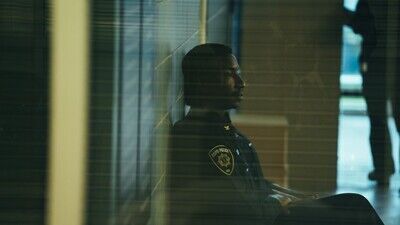Given its structure, the film gives you a chance to work with a troupe of actors; you’re essentially making three short films together. What was that experience like?
I’m deeply grateful for this movie. When I heard the cast, I was stunned, like, “Wow.” It meant a lot to me because you want to work with people you also think are really good. It’s flattering because Yorgos is one of the best there is. It was just a real treat.
I didn’t get to work with Willem a lot—at all, really. I shared one space in a scene with him, but we weren’t interacting. I love that guy. I love him. And it was so fun to be in the presence of somebody I admired since childhood. One element that’s been consistent with a lot of these actors I’ve had such reverence for is their childlike sense of play, their willingness to enjoy themselves, no matter what.
I remember seeing that in Courtney B. Vance when I was working on “Uncorked.” He’s one of the funniest people I’ve ever met, genuinely. I think about certain things that happened during the filming of that movie, and I laugh out loud. And it was the same with Willem. I don’t think that’s a coincidence. It’s always a great reminder when I see these older actors I’ve admired for such a long time.
My favorite class in graduate school was clown class. It changed my life, and it made me a much better actor because it’s all about keeping that spark of joy and play alive. It’s silly, it’s fun. All these older actors always have that sense of silliness and play, this curiosity. That’s something that I thought about a lot, making “Kinds of Kindness.” Even after filming, that’s something that sticks in my mind.
You share more screen time with Jesse Plemons than with the other actors in the ensemble, particularly in the second story, where you’re both playing cops. What do you recall about that collaboration?
Jesse is the real deal. He’s one of those actors who is not trying to put on a face but is doing this for the sake of the truth of it: “How do I fully do that, as honestly as possible?” However it looks, that’s how it looks. I was happy to work with him; I have a tremendous amount of respect for him. The scene that I found most challenging with him, which is going to sound strange: as we’re leaving the police station at the beginning [of the second story,] we have this Aaron Sorkin walk-and-talk, and we have to time our conversation, in a way, which is difficult, because you want to have the conversation. Those are the scenes that I find most challenging because you’re thinking about steps or having to be at a certain point.

